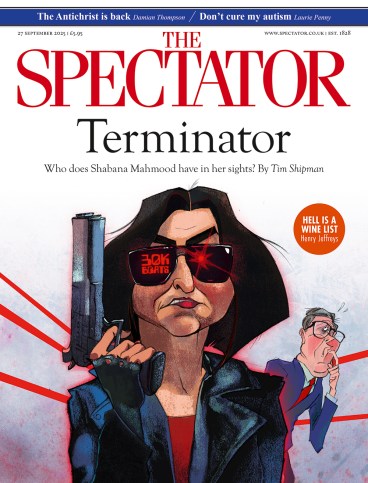
For Competition 3418 you were invited to provide a pompous leading article on a trivial subject.
The ubiquity of ‘Hi’ replacing ‘Dear’; conjoined teabags; the apostrophe (ban it!); the semi-colon (save it!): all featured in a medium-sized, accomplished entry. The half-dozen below stood out and earn their authors the £25 John Lewis vouchers.
Our readers will be aware of our unblemished record in reading the runes. And if there is one certain indicator of the unravelling of the fabric of western civilisation, surely it is the unending decline in quality of clothes pegs. Regardless of the emporium from which they are purchased, both plastic and wooden pegs are so woefully constructed that their falling apart may be taken as societal collapse in microcosm. It was Spinoza, a second-rate philosopher perhaps better known for herme-neutics, who said, ‘Do not weep. Do not wax indignant. Understand.’ But Spinoza, we assert, was not compelled to contend with the existential crisis engendered by disintegrating clothes pegs. Truly, these are dark times, and, while this organ is not noted for any predilection for state intervention, on this occasion, we implore the government to take all reasonable steps to arrest the decline, and thus save us all.
Simon Godziek
Cefinn has fallen. A nation stands aghast, staring in horror at the frayed hem of its sartorial ambitions. This is a cultural calamity, a sombre modern echo of the Spitalfields looms being silenced for ever. Samantha Cameron’s venture was a stirring British call to arms, its proud mission to swathe an elite in lines of modern purpose and dignified restraint. That so noble an enterprise could be slain by the brute beast of international commerce is not merely a loss to fashion but the starkest of warnings to Britain. Once, Lancashire’s mills clothed the world; once, British couture was a global symbol of elegance. Today, we cannot even sustain a minor boutique label. If we are to revive our national pride we must rebuild and reimagine bon ton itself, lest we condemn these islands to a future of leggings and leisurewear. This is not about dresses. It is about decline.
Tom Adam
The popularity of cross-breed dogs is doubtless well-merited, but their nomenclature is a tangle of portmanteau inconsistencies. The first to claim considerable public attention was the labrador/poodle cross jocularly nicknamed the labradoodle. A pleasant name, but unserious, which set a fashion for jocular portmanteaux, like Schnoodle, Weimardoodle, and even (for a sheepdog cross) a Sheepadoodle.
A quite different logic of word-formation led to naming a Cavalier King Charles spaniel/poodle cross a Cavapoo, but a lazy analogy has led a cocker spaniel/poodle cross to be commonly referred to as a ‘Cockapoo’, eliminating the alveolar consonant ‘r’ in favour of a mere grunting ‘a’, without regard for etymological consistency. Other names have been even less fortunately chosen; we have heard a shit-zu/poodle cross referred to as a shittipoo – an appellation showing scant respect for the animal.
Nomenclatural anarchy prevails, yet the Kennel Club remains resoundingly silent about it. This must change.
George Simmers
The late Roger Scruton was a high-minded critic of pop music, arguing that it numbed the soul rather than expressing deep feelings. His approach to modern culture and politics bore similarities to Swift’s use of timbre and irony to expose love’s follies. So where should we position the pop-cultural icon of our time on an 18th-century axis? Is Travis Kelce’s ‘modest proposal’ a sly wink in the direction of the Dean, whose 1729 satirical essay shocked polite society? Is the sarcastic Dubliner a worthy member of Taylor’s ‘tortured poets department’? Should he be granted tenure? One is reluctant to – in the words of William Rees-Mogg – break a butterfly on a wheel. Nonetheless, throughout history bestselling singer-songwriters – and lepidopterists! – tend to come full circle, like revolving gramophone records.
John O’Byrne
Let there be no equivocation in the matter. We may say, without fear of contradiction, that from across the broad Atlantic a terror threatens our very identity. Type, if you will, in Word, a few lines of th’Immortal Bard, of Wordsworth or Tennyson. Did they not, we may ask, in their wisdom, choose to use a semi-colon? And yet that precious mark will be condemned, nay, struck down, with vaunting arrogance, by Copilot. Artificial it may be; intelligent it is not. It boots not to say that this is trivial. Such protestations must be taken cum grano salis. For it is beyond peradventure that our language – hence, our very identity – faces what we have no hesitation in describing as an existential threat. This is punctuational censorship of the most ab-horrent kind. Liz Truss would save the West. It behoves every English soul to summon Lynne Truss to save England.
Nicholas Hodgson
As a prestigious publication we are committed to the preservation of exemplary standards in matters of communication. After perspicacious consideration and without temerity, we feel obliged to express our perturbation apropos the laxity of grammatical exactitude exhibited by those whose requisite responsibility it is to uphold academical excellence. How abhorrent it is to hear news announcers referring to ‘less people’ or politicians denouncing someone who has ‘broke the rules.’ The punctilious rhetorician Sir Winston Churchill would be revolving in his interment location were he to hear his successors confusing who with whom or sat with sitting. To the argument that we purists are revolting we unashamedly reply, indeed we are! We righteously rebel against linguistic imprecision. Dotty and cross we might be, but learning to dot the i’s and cross the t’s is a meritorious pursuit. Let peasants ‘talk proper’. We pedants prefer to speak properly!
Alan Millard
No. 3421: right to reply
You are invited to submit a reply from Slough to offset Betjeman’s rude lines on the subject (16 lines maximum). Please email entries to competition@spectator.co.uk by midday on 8 October.






Comments